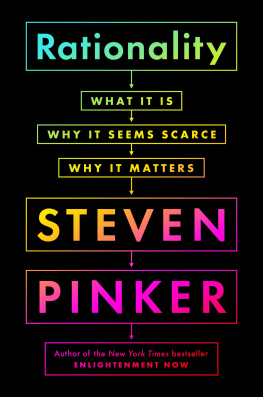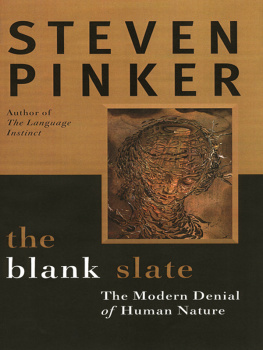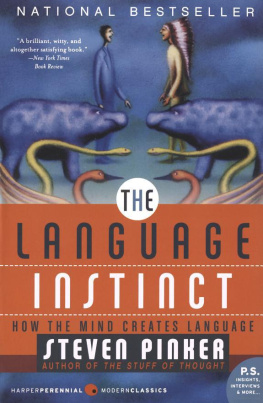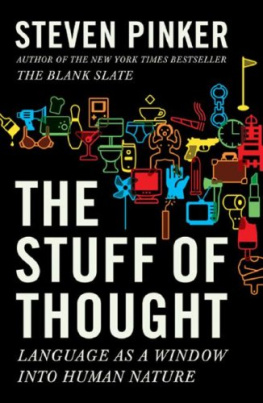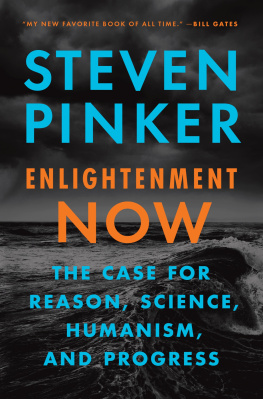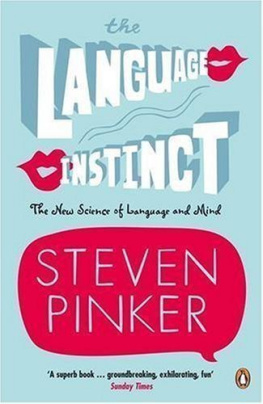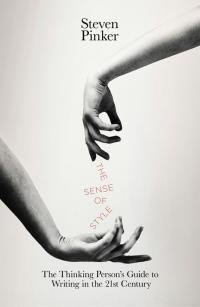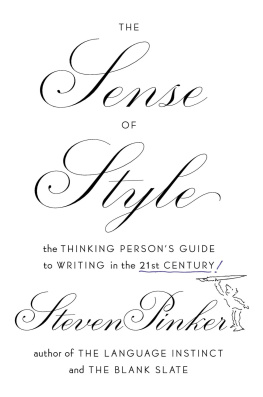Contents
BY THE SAME AUTHOR
Language Learnability and Language Development
Learnability and Cognition
The Language Instinct
How the Mind Works
Words and Rules
The Blank Slate
The Stuff of Thought
The Better Angels of Our Nature
Language, Cognition, and Human Nature: Selected Articles
EDITED BY STEVEN PINKER
Visual Cognition
Connections and Symbols (with Jacques Mehler)
Lexical and Conceptual Semantics (with Beth Levin)
The Best American Science and Nature Writing 2004
To Susan Pinker and Robert Pinker
who have a way with words
Prologue
I love style manuals. Ever since I was assigned Strunk and Whites The Elements of Style in an introductory psychology course, the writing guide has been among my favorite literary genres. Its not just that I welcome advice on the lifelong challenge of perfecting the craft of writing. Its also that credible guidance on writing must itself be well written, and the best of the manuals are paragons of their own advice. William Strunks course notes on writing, which his student E. B. White turned into their famous little book, was studded with gems of self-exemplification such as Write with nouns and verbs, Put the emphatic words of a sentence at the end, and best of all, his prime directive, Omit needless words. Many eminent stylists have applied their gifts to explaining the art, including Kingsley Amis, Jacques Barzun, Ambrose Bierce, Bill Bryson, Robert Graves, Tracy Kidder, Stephen King, Elmore Leonard, F. L. Lucas, George Orwell, William Safire, and of course White himself, the beloved author of Charlottes Web and Stuart Little. Here is the great essayist reminiscing about his teacher:
In the days when I was sitting in his class, he omitted so many needless words, and omitted them so forcibly and with such eagerness
I like to read style manuals for another reason, the one that sends botanists to the garden and chemists to the kitchen: its a practical application of our science. I am a psycholinguist and a cognitive scientist, and what is style, after all, but the effective use of words to engage the human mind? Its all the more captivating to someone who seeks to explain these fields to a wide readership. I think about how language works so that I can best explain how language works.
But my professional acquaintance with language has led me to read the traditional manuals with a growing sense of unease. Strunk and White, for all their intuitive feel for style, had a tenuous grasp of grammar.
Self-contradiction aside, we now know that telling writers to avoid the passive is bad advice. Linguistic research has shown that the passive construction has a number of indispensable functions because of the way it engages a readers attention and memory. A skilled writer should know what those functions are and push back against copy editors who, under the influence of grammatically nave style guides, blue-pencil every passive construction they spot into an active one.
Style manuals that are innocent of linguistics also are crippled in dealing with the aspect of writing that evokes the most emotion: correct and incorrect usage. Many style manuals treat traditional rules of usage the way fundamentalists treat the Ten Commandments: as unerring laws chiseled in sapphire for mortals to obey or risk eternal damnation. But skeptics and freethinkers who probe the history of these rules have found that they belong to an oral tradition of folklore and myth. For many reasons, manuals that are credulous about the inerrancy of the traditional rules dont serve writers well. Although some of the rules can make prose better, many of them make it worse, and writers are better off flouting them. The rules often mash together issues of grammatical correctness, logical coherence, formal style, and standard dialect, but a skilled writer needs to keep them straight. And the orthodox stylebooks are ill equipped to deal with an inescapable fact about language: it changes over time. Language is not a protocol legislated by an authority but rather a wiki that pools the contributions of millions of writers and speakers, who ceaselessly bend the language to their needs and who inexorably age, die, and get replaced by their children, who adapt the language in their turn.
Yet the authors of the classic manuals wrote as if the language they grew up with were immortal, and failed to cultivate an ear for ongoing change. Strunk and White, writing in the early and middle decades of the twentieth century, condemned then-new verbs like personalize, finalize, host, chair, and debut, and warned writers never to use fix for repair or claim for declare. Worse, they justified their peeves with cockamamie rationalizations. The verb contact, they argued, is vague and self-important. Do not contact people; get in touch with them, look them up, phone them, find them, or meet them. But of course the vagueness of to contact is exactly why it caught on: sometimes a writer doesnt need to know how one person will get in touch with another, as long as he does so. Or consider this head-scratcher, concocted to explain why a writer should never use a number word with people, only with persons: If of six people five went away, how many people would be left? Answer: one people. By the same logic, writers should avoid using numbers with irregular plurals such as men, children, and teeth (If of six children five went away ).
In the last edition published in his lifetime, White did acknowledge some changes to the language, instigated by youths who speak to other youths in a tongue of their own devising: they renovate the language with a wild vigor, as they would a basement apartment. Whites condescension to these youths (now in their retirement years) led him to predict the passing of nerd, psyched, ripoff, dude, geek, and funky, all of which have become entrenched in the language.
The graybeard sensibilities of the style mavens come not just from an underappreciation of the fact of language change but from a lack of reflection on their own psychology. As people age, they confuse changes in themselves with changes in the world, and changes in the world with moral declinethe illusion of the good old days.
The common language is disappearing. It is slowly being crushed to death under the weight of verbal conglomerate, a pseudospeech at once both pretentious and feeble, that is created daily by millions of blunders and inaccuracies in grammar, syntax, idiom, metaphor, logic, and common sense. In the history of modern English there is no period in which such victory over thought-in-speech has been so widespread.1978
Recent graduates, including those with university degrees, seem to have no mastery of the language at all. They cannot construct a simple declarative sentence, either orally or in writing. They cannot spell common, everyday words. Punctuation is apparently no longer taught. Grammar is a complete mystery to almost all recent graduates.1961
From every college in the country goes up the cry, Our freshmen cant spell, cant punctuate. Every high school is in disrepair because its pupils are so ignorant of the merest rudiments.1917


